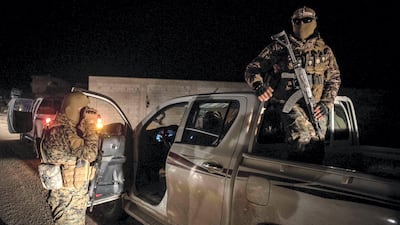Talks between the United States and Turkey concluded on Tuesday with no breakthrough in sight as Washington's new defence chief vowed that the US will prevent any invasion of northern Syria by Ankara.
Turkish President Recep Tayyip Erdogan has repeatedly warned that it is preparing an offensive into Syria against the People's Protection Units, a Kurdish militia known more commonly as the YPG, which the US has supported as the main fighting force against ISIS under the Syrian Democratic forces (SDF) umbrella.
The two-day-round of talks included members of the US-Turkey safe zone working group that the two countries announced last month.
A US defence spokesperson told The National that dialogue is the "only way to secure the [Turkish-Syrian] border area", and that any "unco-ordinated military operations by Turkey will undermine [US-Turkish] shared interest".
Earlier on Tuesday, Washington’s Defence Secretary Mark Esper said that any unilateral Turkish incursion into Syria would be “unacceptable.” His words put the US on a collision course with one of its main Nato allies.
“We have been heavily engaged with the Turks with regard to their security interests in northern Syria ... clearly we believe any unilateral action by them would be unacceptable,” he said. “What we are trying to do now is work out with them an arrangement to address their concerns.”
Turkey appeared adamant, however, that the operation would go ahead. President Erdogan said in a televised speech on Tuesday that "Turkey has the right to eliminate all threats against its national security” and "God willing, we will carry on the process started with (previous offensives into Syria) to the next stage very soon”.
Turkey views the Syrian Kurdish forces in the north east of Syria as members of the Kurdistan Workers’ Party (PKK), designated by Ankara as a terrorist organisation. Adding to the complexity of the situation, US troops in that region could be in the line of fire in an event of a Turkish incursion.
Charles Lister, a senior fellow at the Middle East Institute, described a sense of “ambiguity” in the US’s position.
"America's willingness to 'fire back' in the event of a Turkish incursion is far from guaranteed, and this ambiguity is precisely why the Turks are continuing to push hard," said Mr Lister.
“American ambiguity is also why a very limited Turkish incursion, perhaps after Eid al Adha (which is this weekend), is still possible – perhaps focused on an Arab majority area like Tel Abyad and restricted primarily to border areas.”
Mr Lister did not completely rule out the potential of a compromise. The US has hinted that it could agree to a 12 kilometre phased or gradual safe zone for Turkey on the Syrian border, while Ankara still insists on a 32km non-phased area.
“Both Turkey and the US are maintaining maximalist positions until the brink, where one hopes some movement might begin,” he said.
Mr Lister said the Syria standoff as existential for both Mr Erdogan and to US interests. In order to remain in power, the Turkish President needs to demonstrate a continued resistance to the PKK and to expand the territories that Syrian refugees can be encouraged to return to.
Likewise, for the US: “The little American leverage that remains today [in Syria] is pinned on our ability to remain military present alongside the Syrian Democratic Forces. Should Turkey intervene and we demonstrate an inability to come to the SDF’s defence, it’s hard to see the relationship lasting for long, and the US will be out of Syria in short order. The stakes really couldn’t be higher.”
Aaron Stein, the director of the Middle East at Foreign Policy Research Institute, said the US’s hands are tied and there is little to no chance for an agreement. When asked about the US’s warning, he said: “Mr Esper has to look out for US men and women in Syria, but it won’t functionally make much of a difference if Ankara chooses to invade despite the risk of killing Americans”.
“Once Turkey makes that choice there isn’t an actual [US] plan to stop them because to do so would require shooting at a Nato ally,” Mr Stein said.
The two countries have opposing policies with no signs of either – especially Turkey – changing its mind on the issue anytime soon, he said.

